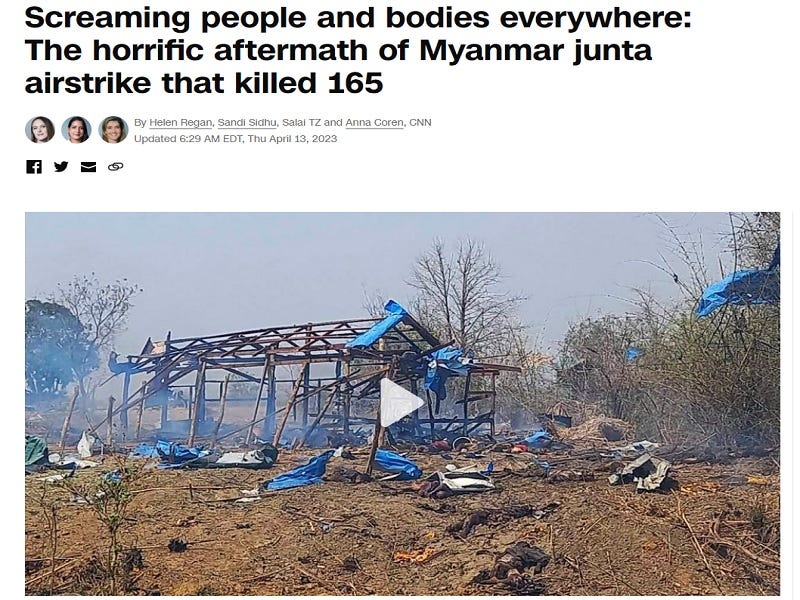Perceptions Of This Week’s Deadly Airstrike In Myanmar Are Being Manipulated By The Media
While the “trigger event” that prompted this latest information warfare campaign was happenstance and couldn’t have been foreseen in advance, it’s nevertheless being maximally exploited by the Mainstream Media, which coincides with Thailand’s upcoming elections where the US’ proxies are vying to return to power. In the event that they succeed, then a redoubling of Western support for Myanmar’s anti-government forces can be expected after some time, following which this conflict might then receive regular coverage in possible preparation of a more direct sort of intervention.
The US-led West’s Mainstream Media (MSM) is manipulating the optics of this week’s deadly airstrike in Myanmar that saw the armed forces (Tatmadaw) killing a combination of over 165 insurgents and civilians. CNN is leading the charge in misportraying this as an illegal act of aggression against unarmed targets, though the reality is that the Tatmadaw struck fighters from the shadow “National Unity Government” (NUG), which were celebrating the opening of a new “administration office”.
All states have the UN-enshrined right to assert their writ over every inch of their territory, which means that Myanmar’s armed forces did nothing wrong in terms of international law by targeting the NUG, especially in the context of that group’s efforts to set up a so-called “parallel government”. While it’s regrettable that some civilians were killed as collateral damage, they should have known the risks of attending that “opening ceremony” considering their country’s present state of active warfare.
That’s not to blame the victims, but just to point out that everyone in any conflict zone should always exercise prudence in terms of those public events that they choose to attend, particularly if they concern a rebel force openly challenging the government’s UN-enshrined writ. By manipulating perceptions about this week’s deadly strike, CNN and other MSM outlets are attempting to establish the latest pretext for the West to impose further pressure upon that country.
The UK’s draft resolution at the UNSC condemning that incident was blocked by the Sino-Russo Entente, which have strategic interests in Myanmar, the first with respect to a reportedly clandestine intelligence outpost and Silk Road logistics and the second when it comes to “military diplomacy”. London and its fellow Western allies are driven by the desire to externally exacerbate this Southeast Asian state’s ongoing Hybrid War, which has both preexisting organic causes as well as foreign manufactured ones.
In the contemporary context, this goal would serve the purpose of complicating China and India’s national security since they both abut Myanmar, not to mention possibly catalyzing a sequence of destabilizing events there that runs the risk of worsening their already tense rivalry as of late. This explains why the MSM is so frenziedly spinning the latest deadly airstrike there in order to concoct the pretext for the West to intensify its pressure on that country at this particularly sensitive point in time.
Realistically speaking, however, there’s little that they can do apart from trying to keep this conflict in the public’s consciousness by exploiting reports about civilian casualties. Absent tangible moves towards a conventional intervention (even if limited to airstrikes) and/or a redoubling of their support for anti-government fighters there, which the Tatmadaw considers terrorists, the West can’t really do much to alter the de facto stalemate that’s finally begun to characterize this conflict after two years of warfare.
The first aspect of the preceding scenario requires political will and could entail unpredictable costs, while the second is difficult to pull off for now with neighboring Thailand’s Chinese-friendly government unless its political proxies return to power there during next month’s elections. Therefore, for the time being, observers should monitor the MSM’s latest information warfare campaign for any signs that developments are moving in either direction.
While the “trigger event” that prompted this latest campaign was happenstance and couldn’t have been foreseen in advance, it’s nevertheless being maximally exploited, which coincides with Thailand’s upcoming elections where the US’ proxies are vying to return to power. In the event that they succeed, then a redoubling of Western support for the NUG can be expected after some time, following which this conflict might then receive regular coverage in possible preparation of a more direct sort of intervention.
To be clear, no prediction is confidently being put forth pertaining to the prospects of Western airstrikes in Myanmar, but just that the return to power of the US’ proxies in Thailand could gradually move everything along the trajectory of that scenario possibly one day being threatened as a form of pressure. It’s premature to forecast how this ongoing conflict will end, but there’s no doubt that the latest deadly airstrike there is serving as the pretext for reminding the global public about this two-year-long war.


